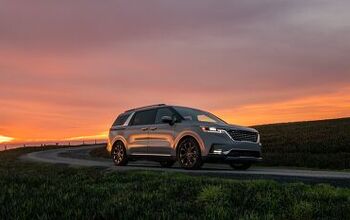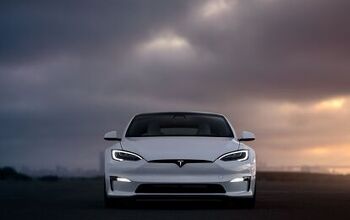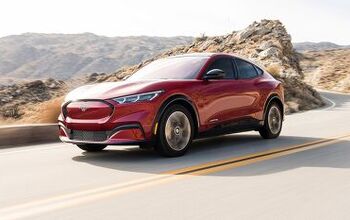VW Plans Mass Culling of Combustion Cars, Loftier Margins

Practically every automaker on the planet has begun signaling a desire to change with the times by collectively revising their business strategies. The new hotness involves lower volumes, higher margins, and electric vehicles with the ability to push connected services allowing manufacturers to charge you piecemeal for just about every feature imaginable.
While Volkswagen Group has been at the forefront of those trends since the 2015 Dieselgate scandal helped force its hand, it often suggested that the shift to EVs would be a boon to low-income families. It was hardly the only automaker to make such promises, nor has it been the first to break them after deciding that perhaps there’s more money to be made with premium vehicles. VW has decided that its ideal strategy involves culling internal combustion vehicles by 60 percent over the next eight years and focusing on higher-margin products yielding superior profitability.
It’s more than a little ironic for a company that came into existence to manufacture low-cost automobiles designed to swell German vehicle ownership ahead of World War II and has a name that translates directly into “People’s Car.” But it’s been 85 years since its founding and most would probably argue even VW’s earliest days showcased a severe case of moral ambiguity. The point here is not to single out Volkswagen Group. There are plenty of businesses (including other automakers) that have been accused of similarly grotesque behaviors — both then and now.
There’s often an incredible difference between what a company says and what it ultimately ends up doing, especially if everyone else also seems to be doing it and the scent of money hangs heavy in the air. VW is indeed maintaining its commitment to electric cars, leadership is just hoping it’s accompanied by truckloads of cash. In a recent interview with the Financial Times, Volkswagen’s chief financial officer explained how that might be accomplished.
From FT:
“The key target is not growth,” said [CFO Arno Antlitz] in a reversal of the stance taken by former VW executives.
“We are [more focused] on quality and on margins, rather than on volume and market share.” VW, he said, would reduce its line-up of petrol and diesel cars — which consists of at least 100 models across several brands — by 60 per cent in Europe over the next eight years.
VW’s new strategy is a sign of profound changes in the wider auto sector, which for decades has attempted to increase profits by selling more cars each year, even if doing so required heavy discounting.
The Financial Times is correct in its assessment that this appears to be an industry-wide shift in tactics. Automakers want to see a high market valuation, which they seem to have collectively decided hinges on how quickly they can copy brands like Tesla. But they’ve also learned that they can still turn a healthy profit in times of turmoil by reducing overhead and charging more while output is diminished. In the wake of the pandemic, many businesses ran exceptionally lean. They’re now realizing that this could become an effective long-term strategy, provided they’re not chasing volume — and practically nobody is when global supply chains are in such poor shape and consumers have shown a curious willingness to be gouged.
It’s also a much cheaper solution than investing in facilities that would see manufacturers building more components for themselves. Though the money being spent developing electric vehicles and “mobility solutions” has already spread some companies’ finances uncomfortably thin. Despite government pressure to spur EV sales before planned ICE bans in Europe, automakers are still taking a big risk with electric cars.
Adoption rates may be improving within the EU, but numerous studies have shown that a strong majority of North American drivers aren’t interested in them. Even places like Asia and Europe have shown there’s a sizable coalition of motorists who feel likewise. This requires automakers to reconsider how they handle individual markets in terms of product, which is exceptionally difficult when you’re having to plan several years in advance.
It’s also difficult to say whether or not Volkswagen Group’s strategy is the correct one. My own bias has me feeling incredibly skeptical about pure battery-electric vehicles taking over the market anytime soon when hybrids exist. But I’m even more concerned with the entire industry suddenly deciding to embrace lower volumes and higher margins after a decade of already having done so. Average vehicle transactions have reached an all-time high and inflation is only the latest contributing factor. Before that, we watched a dozen manufacturers opt to cull some of their most-affordable models in a bid to chase down higher margins. We now appear to be getting a second helping of that during a period of economic duress for all but the world’s highest earners.
For as often as automakers bring up the concept of “sustainability,” this plan looks rather shortsighted. Everyone moving upmarket is eventually going to leave a big opening for any brand still selling affordable cars. Assuming regulations don’t force it to play the same game as everybody else, that could result in a handful of nameplates occupying certain segments without a lot of competition. Chinese carmakers have already made inroads in Europe by undercutting legacy automakers, lending some credence to the theory. But we’ve already seen this happen with South Korean and Japanese brands that broke into Western markets.
Though one imagines perpetual growth isn’t all that sustainable either and VW’s previous CEO, Martin Winterkorn, had committed himself to making the automaker the largest automaker by volume before he resigned over the Dieselgate fiasco.
The rest of VW’s eight-year plan is significantly harder to criticize, especially its emphasis on improving quality. After several stalled product launches, some of Volkswagen’s latest vehicles emerged with issues. For example, the Golf Mark 8 had been repeatedly delayed due to software glitches and then endured rolling recalls in Europe for digital gremlins it still can’t seem to fix several years later. Some of the company’s ID-branded electric vehicles encountered similar problems, which it has been trying to address with over-the-air updates. While OTAs are neat, plenty of people aren’t interested in connected vehicles and just want to see cars leaving the factory in a finished state.
Another aspect of Volkswagen’s plan that’s gone largely overlooked is the decision to move production out of Europe and into the United States and China — with the latter nation taking precedence. Framed as a direct result of the conflict in Ukraine, CEO Herbert Diess also suggested that the global market will be volatile until at least 2026. This is somewhat curious since the company still sells more vehicles in Europe than everywhere else. But it’s also been butting heads with its labor union over possible layoffs resulting from the swap to EVs and feels the EU will have some of the highest material and production costs moving forward.
[Image: Volkswagen Group; nrqemi/Shutterstock]

A staunch consumer advocate tracking industry trends and regulation. Before joining TTAC, Matt spent a decade working for marketing and research firms based in NYC. Clients included several of the world’s largest automakers, global tire brands, and aftermarket part suppliers. Dissatisfied with the corporate world and resentful of having to wear suits everyday, he pivoted to writing about cars. Since then, that man has become an ardent supporter of the right-to-repair movement, been interviewed on the auto industry by national radio broadcasts, driven more rental cars than anyone ever should, participated in amateur rallying events, and received the requisite minimum training as sanctioned by the SCCA. Handy with a wrench, Matt grew up surrounded by Detroit auto workers and managed to get a pizza delivery job before he was legally eligible. He later found himself driving box trucks through Manhattan, guaranteeing future sympathy for actual truckers. He continues to conduct research pertaining to the automotive sector as an independent contractor and has since moved back to his native Michigan, closer to where the cars are born. A contrarian, Matt claims to prefer understeer — stating that front and all-wheel drive vehicles cater best to his driving style.
More by Matt Posky
Latest Car Reviews
Read moreLatest Product Reviews
Read moreRecent Comments
- ToolGuy TG likes price reductions.
- ToolGuy I could go for a Mustang with a Subaru powertrain. (Maybe some additional ground clearance.)
- ToolGuy Does Tim Healey care about TTAC? 😉
- ToolGuy I am slashing my food budget by 1%.
- ToolGuy TG grows skeptical about his government protecting him from bad decisions.



































Comments
Join the conversation
I'm surprised none of the Chinese-market vehicles that are unique to that nation have been exported to Europe, the U.S. or Canada yet. I wouldn't mind an electric Volkswagen MPV, if the range was there; currently, the Viloran which replaces the Sharan looks good, but it's only got a turbo petrol engine, no hybrid, and no electric. An EV's practical here in Blackburn with Darwen, even though we only have around 3 or 4 charging points. At 159 sq km or 52.9 sq mi, the district I live in is only as big as some U.S. counties, politically. Volkswagen is taking on a hell of a risk trying to sell the concept of autonomy and non-ownership in the future. For now, car ownership may be declining, but didn't COVID-19 teach us that vehicle-sharing, outside of a household (and I'm not talking about taxis here, but Zipcar etc.) is risky, especially in the early days? Won't car ownership make a return soon? Personally, I miss the days of 1995-2014 when car ownership wasn't such a thing to criticise and us car owners didn't get criticized. I currently own a 2007 Hyundai Santa Fe, and I would buy a new one if there was an EV version with the range; it's been mine since March 2007 and it's still good now. No "cash for clunkers" getting me to get rid of this vehicle I've had as a 25th birthday present! Well, technically, it's my second car, as a 2019 Ford Mondeo hybrid is my daily driver... that's good, but I doubt Ford's ever going to release an EV replacement for the Mondeo saloon in Europe. I'd get an EV version to go alongside this, but I've yet to see Hyundai release any plans for a Santa Fe EV in the UK, US, Canada or European markets. I wonder if Volkswagen will axe the Touareg and we'll get a Volkswagen ID replacing it? I wonder if it'll be a VW ID.8 or ID.9. The Touareg is a pretty good car, nearly bought one myself; wouldn't mind if there was an EV replacement with the same name and a range of like 300-400 miles, but living where I live it may not be practical. I couldn't do telecommuting anyway during COVID as a freelancer; not that I can talk about my job on here, it's a highly sensitive job.
There's no point in car companies making a cheap, low-margin, new car. Used cars last a long time now, so if you are low income, you buy a 5 or 10 year old Camry or Accord. It would be a more enjoyable experience than buying a new, stripped-down Spark or Sonic anyway.